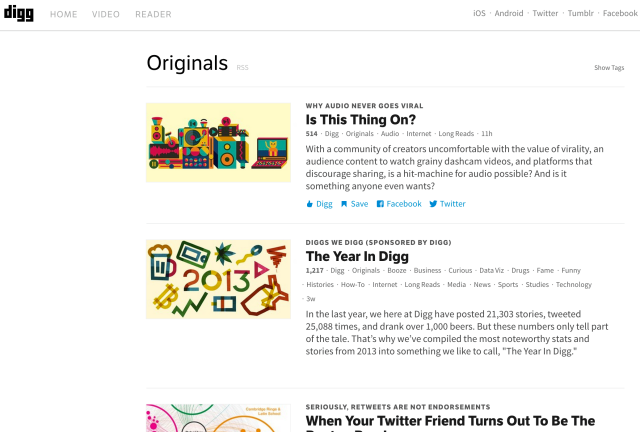

Digg is currently testing a system which would see the viral news aggregator running its own original content on the Digg.com homepage, the company confirms to us today. This would be a new direction for the betaworks-backed service, which has historically collected the most interesting stories from around the web on its site, where they’re then voted on by Digg users.
We first noticed the test today, when a story on the Digg homepage had an interesting source: not another news website or blog, but Digg.com itself. Clicking through on the link to the post in question – an interesting longer read about why audio content never goes viral – and we found the resulting page was branded as a “Digg Original.”
According to Digg’s Creative and Editorial Director, David Weiner, Digg Originals are still in the experimental phase. “We look at Digg as having the potential to be like any other editorial outlet that features freelancer content,” he says. “This was a piece we commissioned to be written for Digg, so there was never any question of where else this could live.”

By commissioned, what Weiner means is “paid.” The company says it offers fair and competitive rates. Right now, there aren’t any set rules around the process, only that the Digg editorial team will be firmly in control of anything that goes live on the site whether a Digg Original, or any other aggregated content, for that matter.
He adds, “so as long as it adheres to our editorial mission of providing the best and most interesting stuff, we’re pretty open.”
Digg has run “Originals” similar to the one appearing on Thursday a couple of times before, or so it appears. However, in these earlier cases, the content was penned by betaworks staff themselves. One story, for example, was a look back at the year in Digg, while another on the topic of Twitter networks was written by Gilad Lotan, a Chief Scientist at betaworks.

Digg doesn’t currently have a timetable for when it will post more original stories, but hopes to have more work out there “shortly,” says Weiner. “We also don’t want to do content for content’s sake,” he adds. “That said, it’ll probably be a little bit of time before we run as long a piece as this.”
Instead, the company is sketching out some shorter items which may be done in-house by its own editorial team or outsourced to other freelancers. The pieces might also involve video at some point, as video has been one of Digg’s fastest growing verticals, even prompting the site to open up a standalone Video section last November.
One thing to note is that the original story promoted on Thursday on the Digg.com homepage was placed in the marquee position as soon as it went live – that is, it didn’t have to generate clicks, votes or go “viral” elsewhere on the web before earning its top spot. Digg says that it gives similar editorial consideration to other publishers’ work at times, too – something that indicates the different sort of beast today’s Digg is than the one co-founded by Kevin Rose, whose then much larger user base once sent websites crashing just by pushing their stories to its front page.
Though it can be argued that the “Digg effect” is, to some extent, back, the new Digg is more about marrying the concept of a trending post with the human touch that only comes from an editorial eye about what deserves consideration. That puts Digg.com into a category where it could compete with other viral aggregators like BuzzFeed or Reddit, news aggregators like Techmeme, and also with services like Medium, which offers a sort of collaborative blogging platform where top stories and recommended content is also presented to end users.
But Weiner says that Digg Originals are, for now, only for those vetted by Digg staff, and it has no plans to compete directly with Medium by launching its own blogging platform at this time.
Read more : Digg Is Experimenting With Original Content


0 Responses
Stay in touch with the conversation, subscribe to the RSS feed for comments on this post.